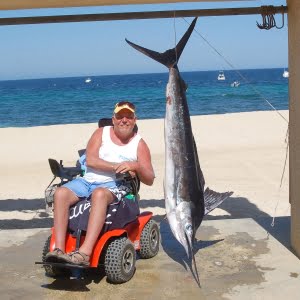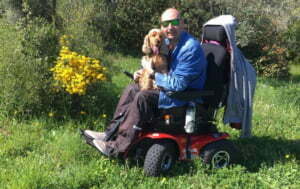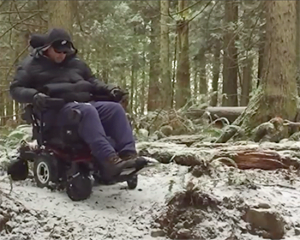Tennessee State Parks’ commitment to inclusive access
Thanks to Tennessee State Parks’ commitment to inclusive ...
Read More
Thomas Grieb from Washington, USA enjoys fishing using his Extreme X8.
Occupational deprivation is defined as ‘prolonged restriction from participation in necessary or meaningful activities due to circumstances outside the individual’s control.’
According to a report from The OT Hub, the consequences of being stuck in the wrong wheelchair can result in having a lack of meaning or purpose in your life and can create or extend mental and/or physical illnesses.
Prolonged occupational deprivation can lead to feelings of despair, erosion of skills, decreased productivity, poor health and social isolation.
However, evidence is mounting that time spent outdoors and getting out into nature can have the same therapeutic benefits as expensive medications and counselling.
Kaiser Permanente is a US-based integrated managed care consortium, always looking for more cost-effective alternatives that deliver better health outcomes. After reviewing the latest evidence about outdoor therapies, Vice President of Total Health Partnerships at Kaiser Permanente, Tyler Norris, summed it up as follows:

Henry Vivet uses his Extreme X8 to enjoy some time with his dog in the French countryside.
For users who rely on medical insurance or public funding for their powerchair, their OT’s medical justification for funding an all-terrain powerchair should always include the positive psychological impacts of increased independence, contributing to the community and the opportunity to pursue meaningful occupations.
Tom Lowell, an Oregon resident and life-long outdoorsman, lost his mobility with the onset of ALS (MND). Mentally, he was deeply affected by his lack of ability to get outdoors, given he was initially equipped with an indoor-only powerchair.

Tom Lowell takes on the snow in the Oregon backwoods using his Frontier V6 AT.
With strong support from his OT, Ron Porter, Tom was finally able to get funding for a Magic Mobility V6 AT and get back out into the woods. Asked why it made such a positive impact on his mental wellbeing, Tom said:
“It really is important to your wellbeing that you get out and live like you always have, or as close as possible. When you’re out beating your way through the backwoods on a V6 AT, you’re totally in the moment and your presence of mind, your awareness of your surroundings.
It is totally rejuvenating for your spirit and your soul.
You really feel like you’ve been somewhere, you’ve experienced something. You look back on your day with fondness. You’ve made some great memories [and] you have a sense of accomplishment.”
If you can have that, you want to sit back and say “man, I was really awesome today.”
What a feeling! You can view more about Tom’s story below:
Learn more about funding options in the United States here, for Australian funding advice click here, or contact us to be connected with your local agent or distributor globally.
Thanks to Tennessee State Parks’ commitment to inclusive ...
Read MoreBe it in summer or winter, two new Extreme X8 users share ...
Read MoreOur award-winning Magic 360 is now available in the USA and ...
Read MoreThis website uses cookies to ensure you get best experience on our website.